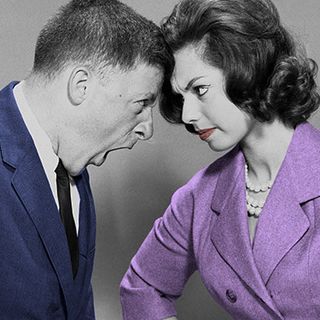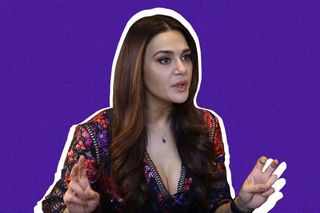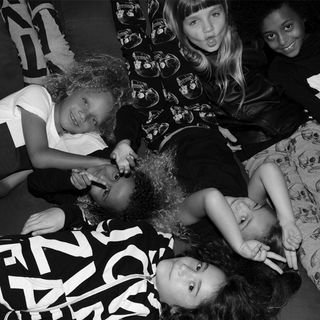
Dear Preity Zinta, Here’s What You Should Have Said About #MeToo
Don’t shut up — just bone up.

A Preity Zinta interview is doing the rounds on Twitter and elsewhere, in which she said some pretty tone-deaf things about #MeToo, the movement that has been rocking Bollywood and other media industries since the beginning of October. It is, shall we say, unfortunate — even a little bizarre; Zinta knows better than anyone how dark and violent the underbelly of Bollywood can be, and had the backbone to stand up to it. Yet, in her interview with Bollywood Hungama’s Talking Films, when she wasn’t minimizing the prevalence of sexual harassment and assault in Bollywood, she was making light of it.
Zinta is saying the interview was poorly edited and does not do justice to her full answers. So, let’s look at a transcription of the full, uncut interview, which is … just as bad. This suggests Zinta truly doesn’t understand what she’s talking about. While some are saying this is reason for her to shut up, we’d suggest that, given her obvious enthusiasm for the topic, she shouldn’t be silenced, but rather, should bone up on the movement, its mission, and how to speak about #MeToo next time.
What Preity Zinta could have said about #MeToo
What she said: “I think it’s important this whole #MeToo movement has started. But it’s important that women use it for the right thing, because there are men — and women — that would use their position of power for their advantage. But I do feel bad when women are using it when it’s not that serious, or for personal vendetta or for publicity. There are a very small percentage of women who are using it, and they’re diluting the movement. But then there are also women who’ve gone through all of this, and me being in the industry, I’ve heard so many stories. So, and you know, if you want to acknowledge there’s a problem, you have to first at least admit there is. And then you solve the problem. But this ‘#MeToo’ movement, if it’s this much [holds fingers close together] in the film industry, it’s that much [holds hands far apart] in every other industry. And at least we have a spotlight here in this industry and people listen to you, and the media is there. But if you’re telling me it’s not in other industries, and not in the business world, and not in politics as you can see with all the stories coming out — that’s rubbish.”
It’s great that you think the #MeToo movement is important! Hold onto that feeling.
#MeToo is about women who feel they have hitherto been powerless, voiceless and taken advantage of, coming together to find strength in numbers, share their stories of harassment and assault, and expose how societies, industries and institutions enable male predation. No one in this movement is coming from a position of power — except the men who have been accused. Therefore, it’s inaccurate and antithetical to the movement to suggest women are abusing their power by sharing their #MeToo stories.
#MeToo is also about challenging the default from believing men’s version of events, to believing women’s. So by saying ‘it’s important that women use it for the right thing,’ you’re suggesting women are using for the wrong thing — and you’re playing into the status quo assumption that women aren’t credible. That’s diluting the movement.
Read more: Why Women Make Anonymous #MeToo Accusations – And Why We Have to Believe Them
Also, you’re right to acknowledge that the inherent media attention to the film industry has enabled #MeToo to flourish there. But we can’t stress enough that there’s literally no one who is saying that sexual harassment and assault is only a problem for the film industry. Men in media, in art, in politics, and in business, among other industries, have been called out, via the movement, for their abuse of power and harassing or abusive behavior.
Next time, try saying: “I think it’s important this whole #MeToo movement has started. Me being in the industry, I’ve heard so many stories. I’m glad they’re finally out in the open, so we can begin to examine why these abuses are happening and how to end them.”
When asked if she has a #MeToo story, Zinta said: “No, I haven’t. [laughs] I wish I had! At least I would have an answer to tell you as to how… No, and that’s what I’m saying. This is a very relevant question. Because people treat you the way you want to be treated.”
First, it’s incredibly insensitive to women who have been harassed, assaulted or raped to joke that you wish it would happen to you.
Second, it’s incredibly insensitive to suggest, by saying “people treat you the way you want to be treated,” that the women who have spoken of their harassment, assault or rape were asking for it. It is also incredibly damaging to the #MeToo movement. Literally no one invites their abuse — that is exactly what makes it abuse, rather than consensual interaction. #MeToo stories typically have at least this in common: Women’s consent was never requested, never considered, or taken for granted; they were not treated the way they wanted to be treated.
Next time, try saying: “No, and given how common these abusive experiences are, judging by the sheer volume of #MeToo stories out there, it must mean that I’ve been lucky.”
Read more: All the Arguments You Need to Convince Doubters of #MeToo
At this point, the interviewer took it upon himself to suggest there are a lot of false, spiteful #MeToo stories, at which point Zinta said: “Yes, it dilutes the entire thing, but I think what is very, very , very important — and I know it’s a very serious topic — but from Class 4 and 5 and 6, 7, 8, 9, but bachho ko,you have to teach them what is right and what is wrong. A lot of times, you know, I’ve grown up with boys. I have two brothers; now, I have 40 cricketers, and even in the film industry, all my friends were mostly actors and their wives. But, a lot of times men think they’re being very cool. They’re not being very cool, they’re being very rude. So that is also … and the reason I know this today is not because I think I’m great, it’s because I live in America. So, I’ve realized how people actually say things and talk about things. So, there are certain things — maybe they are cultural. Maybe there’s ignorance. But I think … and these are things taught in schools overseas, as to how you speak with other genders, and how you sensitivize each other, towards each other. You know, there are certain things of how to approach each other and stuff. So I think that’s important.”
Your support for comprehensive and ongoing sex education teaches the importance of consent and provides examples of healthy relationships is admirable. And you’re definitely right that it’s part of the long-term solution to the misogyny that underpins the #MeToo stories.
Next time try… actually, your original response was pretty good. (Although, we’d suggest that the US is not necessarily the ideal to aspire to, considering the #MeToo movement originated there.)
Finally, Zinta said: “But having said that, the film industry is one of the safest places. They’re some of the most decent people I’ve worked with. So, I feel really bad when people say this industry is really bad. And yes, if they are dodgy people, well, there are bad people everywhere, right? So, you can’t say that. And there’s nothing you can do to change the world. The only thing you can do is change yourself. So, if you go there saying, ‘I’ll do anything.’ Then you’d be stupid not to ask me to do anything. But if I’m coming here and saying that I’m going to work really hard and I’ll do anything to work hard and I have no other nonsense to entertain, you will not … if you feel that I’m good at what I’m doing, you’re going to be like ‘Theek hai, let’s work.’ And people are like that, and I am a walking example of that. So, I don’t believe any of the other things people say. Though I heard a line: ‘Aaj ki sweetu, kal ki #MeToo ho sakti hai (Today’s girlfriend, might be tomorrow’s #MeToo story).’ [laughs] Sorry. [laughs] So, don’t hang out with any sweetu! Sorry. That was Sapna Dubey [Zinta’s character in an upcoming film] talking.”
You can’t say “if you want to acknowledge there’s a problem, you have to first at least admit there is,” then deny the problem in the next breath. It’s great that you’ve worked with decent people in the industry; you are an exception. #MeToo is about highlighting just how common it is for women not to have the same luck or privilege, and examining the mechanisms that allow dodgy people to achieve power and wield it in an abusive way.
The #MeToo movement is proving, each day, each Tweet, each article, that there is something you, and any woman, can do to change the world.
Finally, you’re not funny. Sorry/not sorry. And jokes like this are what dilute the movement.
Next time try saying: It’s never okay to wield power and authority to coerce anyone into sexual activity. That’s at best harassment, at worst, rape. Luckily, women are coming together, in the #MeToo movement, to reveal how common this practice is, how inexcusable it is, and how it won’t be ignored going forward. These women are change-makers.
Liesl Goecker is The Swaddle's managing editor.
Related


Céline Dion Is Starting a Gender Neutral Kids’ Clothing Line and My Heart Will Go On to Buy All of It
